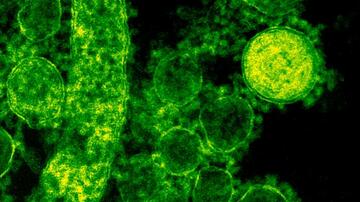Vaccine development
Plans for optimising and validating both existing and new vaccine platforms in animal models have been scheduled.
It usually takes several years, and sometimes even decades, to develop effective and safe vaccines against new viruses. In any case, this is too long in the event of an outbreak which can kill numerous people in a very short period of time, as was the case with the Ebola epidemic in 2014. This research area has therefore declared it a goal to develop vaccines within shorter periods of time for outbreaks of this kind. As a result, so-called “vaccine platforms” have been established over the past few years, which are now being tested and gauged for usability. These vaccine platforms use established and ‘defused’ viruses that are already in use for other vaccines, an example being the measles viruses. These are then recombined with corresponding antigens from a new virus and can therefore be rapidly developed into an emergency vaccine. These platforms were also being used in the SARS-CoV-2 pandemic.
Emergency vaccines against coronaviruses, measles and influenza
Vesicular stomatitis virus (VSV) was used to establish such a platform for the Ebola virus, from which a highly effective vaccine with Ebola virus antigens was developed within a short period of time. The vaccine has already been successfully tested on several people. Vaccine candidates have also been generated for the MERS coronavirus which can cause severe respiratory infection in humans. One of these has demonstrated successful protection from the disease in animal models. The vaccine, which is based on modified vaccinia virus Ankara (MVA), has already reached an advanced stage of development in Munich and has been tested in humans for the first time. In addition to this, new vaccines against the Nipah fever and the Crimean-Congo haemorrhagic fever are to be developed.
Alongside the MVA virus, artificially produced measles viruses are being tested as a vaccine platform for developing rapid emergency vaccines.
CEPI supports the development and manufacture of a vaccine against Middle East Respiratory Syndrome Coronavirus (MERS-CoV).



